|
MLLWR Menu contact
|
|
MLLWR Menu haut
|
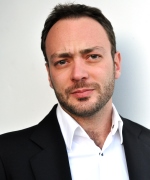 Dr Vaios Koutroulis having studied law at the University of Athens (LLB) and the ULB (LLM), Vaios Koutroulis received his PhD in 2011 for a thesis on the relations between jus contra bellum and jus in bello, for which he was awarded the G. Tenekides award from the Hellenic Society of International Law and International Relations. He is currently a professor of public international law at the Faculty of Law of the Université libre de Bruxelles (ULB). His courses include the law of armed conflict, international criminal law, public international law, and international environmental law. He has also given many lectures on the law of armed conflict and international criminal law in training courses for professionals organised, among others, by the ICRC, the Royal Belgian Military Academy and the International Institute of Humanitarian Law in San Remo. His publications focus mainly on jus in bello and jus contra bellum and include a monograph on belligerent occupation published by Pedone editions (Paris) in 2010. He is member of the board of directors of the Belgian Military Law and the Law of War Centre.
Dr Vaios Koutroulis having studied law at the University of Athens (LLB) and the ULB (LLM), Vaios Koutroulis received his PhD in 2011 for a thesis on the relations between jus contra bellum and jus in bello, for which he was awarded the G. Tenekides award from the Hellenic Society of International Law and International Relations. He is currently a professor of public international law at the Faculty of Law of the Université libre de Bruxelles (ULB). His courses include the law of armed conflict, international criminal law, public international law, and international environmental law. He has also given many lectures on the law of armed conflict and international criminal law in training courses for professionals organised, among others, by the ICRC, the Royal Belgian Military Academy and the International Institute of Humanitarian Law in San Remo. His publications focus mainly on jus in bello and jus contra bellum and include a monograph on belligerent occupation published by Pedone editions (Paris) in 2010. He is member of the board of directors of the Belgian Military Law and the Law of War Centre.
|
|
 Dr Tom Ruys is a professor of international law at Ghent University, where he heads the Ghent Rolin-Jaequemyns International Law Institute (GRILI).
He studied law and international relations at the universities of Ghent (Master of Laws, 2003; Ba. Political science, 2004),
Nottingham (LLM, 2004) and Leuven (Master of Conflict and Sustainable peace studies, 2008). He was a visiting researcher at Yale Law School in 2008 and a
visiting fellow at the Cambridge Lauterpacht Centre in 2016. He holds a doctoral degree from the university of Leuven (2009) and is a member of the Brussels bar (Stibbe).
Tom’s research covers a variety of fields within the domain of public international law, including the law on the use of force,
the law of armed conflict, international dispute settlement, State responsibility, immunities and sanctions law. Tom was previously awarded the Francis Lieber Prize
(2015 article prize and 2011 book prize) as well as the Francis Deák Prize of the American Society of International Law. He is the author of several
publications, including the monograph ‘Armed Attack’ and Article 51 of the UN Charter: evolutions in customary law and practice’
(Cambridge Series in International and Comparative Law, 2010). He is a member of the International Law Association’s Committee on the Use of Force and the International Law Association’s Study Group on Sanctions.
He is vice-director of the Military Law and Law of War Review, co-editor-in-chief of the Journal on the Use of Force and International Law
(JUFIL, Routledge), and a member of the editorial board of the Revue belge de droit international.
Dr Tom Ruys is a professor of international law at Ghent University, where he heads the Ghent Rolin-Jaequemyns International Law Institute (GRILI).
He studied law and international relations at the universities of Ghent (Master of Laws, 2003; Ba. Political science, 2004),
Nottingham (LLM, 2004) and Leuven (Master of Conflict and Sustainable peace studies, 2008). He was a visiting researcher at Yale Law School in 2008 and a
visiting fellow at the Cambridge Lauterpacht Centre in 2016. He holds a doctoral degree from the university of Leuven (2009) and is a member of the Brussels bar (Stibbe).
Tom’s research covers a variety of fields within the domain of public international law, including the law on the use of force,
the law of armed conflict, international dispute settlement, State responsibility, immunities and sanctions law. Tom was previously awarded the Francis Lieber Prize
(2015 article prize and 2011 book prize) as well as the Francis Deák Prize of the American Society of International Law. He is the author of several
publications, including the monograph ‘Armed Attack’ and Article 51 of the UN Charter: evolutions in customary law and practice’
(Cambridge Series in International and Comparative Law, 2010). He is a member of the International Law Association’s Committee on the Use of Force and the International Law Association’s Study Group on Sanctions.
He is vice-director of the Military Law and Law of War Review, co-editor-in-chief of the Journal on the Use of Force and International Law
(JUFIL, Routledge), and a member of the editorial board of the Revue belge de droit international.
|
|
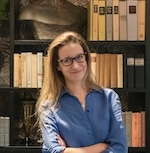 Dr Magdalena (Magda) Pacholska is a Marie Curie postdoctoral fellow at the Asser Institute
(University of Amsterdam), and a research fellow with the Tech, Law & Security Program at the
American University Washington College of Law. She is also the Managing Editor of The Military
Law and the Law of War Review (Edward Elgar).
Before joining Asser, Magda worked as a legal adviser at the Polish General Command of the
Armed Forces, where she focused on the legal aspects of interoperability in combined joint
operations. Her previous experiences include two EU home and justice agencies, and the UN
International Criminal Tribunal for Rwanda. She has been a visiting scholar at the Free University
of Berlin, and the Max Planck Institute Luxembourg for International, European and Regulatory
International Law.
Magda obtained her Ph.D. in Law at the Hebrew University of Jerusalem. She also holds an LL.M.
in International Criminal Law from the University of Amsterdam (joint program with Columbia
Law School), a first degree in Law from the University of Warsaw and a MA in National Security
from the Warsaw Military Academy. Her research interests include emerging and disruptive
military technologies, law of armed conflict, (post)wartime accountability and international legal
theory; Magda’s list of publications can be found here.
Dr Magdalena (Magda) Pacholska is a Marie Curie postdoctoral fellow at the Asser Institute
(University of Amsterdam), and a research fellow with the Tech, Law & Security Program at the
American University Washington College of Law. She is also the Managing Editor of The Military
Law and the Law of War Review (Edward Elgar).
Before joining Asser, Magda worked as a legal adviser at the Polish General Command of the
Armed Forces, where she focused on the legal aspects of interoperability in combined joint
operations. Her previous experiences include two EU home and justice agencies, and the UN
International Criminal Tribunal for Rwanda. She has been a visiting scholar at the Free University
of Berlin, and the Max Planck Institute Luxembourg for International, European and Regulatory
International Law.
Magda obtained her Ph.D. in Law at the Hebrew University of Jerusalem. She also holds an LL.M.
in International Criminal Law from the University of Amsterdam (joint program with Columbia
Law School), a first degree in Law from the University of Warsaw and a MA in National Security
from the Warsaw Military Academy. Her research interests include emerging and disruptive
military technologies, law of armed conflict, (post)wartime accountability and international legal
theory; Magda’s list of publications can be found here.
|
|
Members of the Editorial Board
|
|
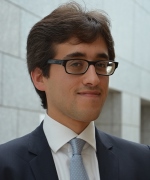 Marco Benatar
is a Research Fellow at the Max Planck Institute Luxembourg for Procedural Law. He holds an MA from the Free University of Brussels (VUB) and an LL.M.
from New York University. His past work experience includes internships at the Belgian Council of State, the United Nations International Law Commission (ILC),
and a position as external collaborator at the International Labour Organization. He was appointed visiting lecturer at the Brussels School of International Studies (University of Kent),
where he taught international humanitarian law and the law of international organizations. Marco has acted as assistant to counsel and advisor in cases before the International Tribunal for the Law of the Sea
and inter-state arbitral tribunals. He has also advised governments on various matters pertaining to international law. His work has been cited by the ILC and has been awarded
the Belgian Society of International Law and Goettingen Journal of International Law essay prizes. Marco serves in the editorial boards of the
Chinese (Taiwan) Yearbook of International Law and Affairs and Wereldbeeld (United Nations Association Flanders). He was involved in drafting the Leuven Manual on the International Law Applicable to Peace Operations (International Society for Military Law and the Law of War) as member of the project management team and group of experts.
Marco Benatar
is a Research Fellow at the Max Planck Institute Luxembourg for Procedural Law. He holds an MA from the Free University of Brussels (VUB) and an LL.M.
from New York University. His past work experience includes internships at the Belgian Council of State, the United Nations International Law Commission (ILC),
and a position as external collaborator at the International Labour Organization. He was appointed visiting lecturer at the Brussels School of International Studies (University of Kent),
where he taught international humanitarian law and the law of international organizations. Marco has acted as assistant to counsel and advisor in cases before the International Tribunal for the Law of the Sea
and inter-state arbitral tribunals. He has also advised governments on various matters pertaining to international law. His work has been cited by the ILC and has been awarded
the Belgian Society of International Law and Goettingen Journal of International Law essay prizes. Marco serves in the editorial boards of the
Chinese (Taiwan) Yearbook of International Law and Affairs and Wereldbeeld (United Nations Association Flanders). He was involved in drafting the Leuven Manual on the International Law Applicable to Peace Operations (International Society for Military Law and the Law of War) as member of the project management team and group of experts.
|
|
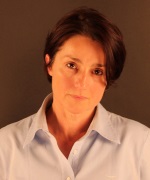 Dr Karine Bannelier is Associate Professor of International Law at the University Grenoble Alpes and Director of the Master 2 Program in International Security and Defense at the same University and at the Paris School of International Relations (ILERI). She holds a PhD in International Law from the University of Paris-Sorbonne and she was Assistant Professor at the same University and visiting fellow at the Australian National University. Researcher at the Center for International Security and European Studies (CESICE), she is founder of the Cyber-Nano-Bio Research Group: Challenges of new technologies for international security, co-founder of AMNECYS (Alpine Multidisciplinary Network on Cyber Security studies) and member of the editorial board of the Revue belge de droit international. Her research focuses on international law including international security law, Jus contra bellum, Jus in bello and Cybersecurity. She participates in various international research networks in these fields and she has been invited to present her work on these issues in some 22 countries and has published or co-edited 8 books and more than 40 articles.
Dr Karine Bannelier is Associate Professor of International Law at the University Grenoble Alpes and Director of the Master 2 Program in International Security and Defense at the same University and at the Paris School of International Relations (ILERI). She holds a PhD in International Law from the University of Paris-Sorbonne and she was Assistant Professor at the same University and visiting fellow at the Australian National University. Researcher at the Center for International Security and European Studies (CESICE), she is founder of the Cyber-Nano-Bio Research Group: Challenges of new technologies for international security, co-founder of AMNECYS (Alpine Multidisciplinary Network on Cyber Security studies) and member of the editorial board of the Revue belge de droit international. Her research focuses on international law including international security law, Jus contra bellum, Jus in bello and Cybersecurity. She participates in various international research networks in these fields and she has been invited to present her work on these issues in some 22 countries and has published or co-edited 8 books and more than 40 articles.
|
|
 Dr Laurie R. Blank is a Clinical Professor of Law and the Director of the International Humanitarian Law Clinic at Emory University School of Law, where she teaches the law of armed conflict and works directly with students to provide assistance to international tribunals, non-governmental organizations and militaries around the world on cutting edge issues in humanitarian law and human rights. She is the co-author of International Law and Armed Conflict: Fundamental Principles and Contemporary Challenges in the Law of War, a casebook on the law of war (with G. Noone, Aspen Publishing 2013; Concise Edition 2016). She is also the co-director of a multi-year project on military training programs in the law of war and the co-author of Law of War Training: Resources for Military and Civilian Leaders. She is a member of the Air and Missile Project on Legal Education and a core expert on the Manual on International Law Applicable to Military Uses of Outer Space. In addition, she is the Chair of the American Society of International Law Lieber Prize Committee, a member of the Homeland Security Academic Advisory Council Subcommittee on Countering Violent Extremism, the series editor of the ICRC’s teaching supplements on IHL, and was a term member of the American Bar Association’s Advisory Committee to the Standing Committee on Law and National Security (2011-2014), and a member of the Public Interest Law and Policy Group’s High Level Working Group on Piracy. She is the author of numerous articles and opinion pieces on topics in the law of armed conflict, including targeted killing and drone strikes, the classification of armed conflict, implementation of the law of armed conflict during military operations, cyber war, and law and legitimacy in armed conflict. Before coming to Emory, she was a Program Officer in the Rule of Law Program at the United States Institute of Peace. At USIP, she directed the Experts’ Working Group on International Humanitarian Law, in particular a multi-year project focusing on New Actors in the Implementation and Enforcement of International Humanitarian Law. Professor Blank received an A.B. in Politics from Princeton University, an M.A. in International Relations from The Paul H. Nitze School of Advanced International Studies (SAIS) at The Johns Hopkins University, and a J.D. from New York University School of Law.
Dr Laurie R. Blank is a Clinical Professor of Law and the Director of the International Humanitarian Law Clinic at Emory University School of Law, where she teaches the law of armed conflict and works directly with students to provide assistance to international tribunals, non-governmental organizations and militaries around the world on cutting edge issues in humanitarian law and human rights. She is the co-author of International Law and Armed Conflict: Fundamental Principles and Contemporary Challenges in the Law of War, a casebook on the law of war (with G. Noone, Aspen Publishing 2013; Concise Edition 2016). She is also the co-director of a multi-year project on military training programs in the law of war and the co-author of Law of War Training: Resources for Military and Civilian Leaders. She is a member of the Air and Missile Project on Legal Education and a core expert on the Manual on International Law Applicable to Military Uses of Outer Space. In addition, she is the Chair of the American Society of International Law Lieber Prize Committee, a member of the Homeland Security Academic Advisory Council Subcommittee on Countering Violent Extremism, the series editor of the ICRC’s teaching supplements on IHL, and was a term member of the American Bar Association’s Advisory Committee to the Standing Committee on Law and National Security (2011-2014), and a member of the Public Interest Law and Policy Group’s High Level Working Group on Piracy. She is the author of numerous articles and opinion pieces on topics in the law of armed conflict, including targeted killing and drone strikes, the classification of armed conflict, implementation of the law of armed conflict during military operations, cyber war, and law and legitimacy in armed conflict. Before coming to Emory, she was a Program Officer in the Rule of Law Program at the United States Institute of Peace. At USIP, she directed the Experts’ Working Group on International Humanitarian Law, in particular a multi-year project focusing on New Actors in the Implementation and Enforcement of International Humanitarian Law. Professor Blank received an A.B. in Politics from Princeton University, an M.A. in International Relations from The Paul H. Nitze School of Advanced International Studies (SAIS) at The Johns Hopkins University, and a J.D. from New York University School of Law.
|
|
 Dr Lawrence Hill Cawthorne is an Associate Professor in Public International Law at the University of Reading, UK, having joined the Law School as a Lecturer in September 2013. Other previous academic positions include Graduate Teaching Assistant in Public International Law at the University of Oxford, Stipendiary Lecturer at Merton College, Oxford, Visiting Fellow in the Law Department at the London School of Economics, and British Research Council Fellow at the John W Kluge Center, Library of Congress, Washington, DC.
His research cuts across a number of topics within public international law, and his recent work has focused on international humanitarian law, international human rights law and international criminal law. He is especially interested in the relationship of these different areas to general international law. His monograph, Detention in Non-International Armed Conflict, which was published in 2016 by Oxford University Press, was awarded the American Society of International Law's 2016 Francis Lieber Prize for best book in the field of international law and armed conflict. It was also shortlisted for the 2016 Society of Legal Scholars' Peter Birks' Book Prize. His scholarship has been cited by, amongst others, the UK Court of Appeal and UK Supreme Court. Lawrence has also acted as advisor to international organisations, as well as legal practitioners in his areas of expertise.
His current research focuses on the intersection between international humanitarian law and general international law, and more specifically the nature of rights and obligations under international humanitarian law.
Dr Lawrence Hill Cawthorne is an Associate Professor in Public International Law at the University of Reading, UK, having joined the Law School as a Lecturer in September 2013. Other previous academic positions include Graduate Teaching Assistant in Public International Law at the University of Oxford, Stipendiary Lecturer at Merton College, Oxford, Visiting Fellow in the Law Department at the London School of Economics, and British Research Council Fellow at the John W Kluge Center, Library of Congress, Washington, DC.
His research cuts across a number of topics within public international law, and his recent work has focused on international humanitarian law, international human rights law and international criminal law. He is especially interested in the relationship of these different areas to general international law. His monograph, Detention in Non-International Armed Conflict, which was published in 2016 by Oxford University Press, was awarded the American Society of International Law's 2016 Francis Lieber Prize for best book in the field of international law and armed conflict. It was also shortlisted for the 2016 Society of Legal Scholars' Peter Birks' Book Prize. His scholarship has been cited by, amongst others, the UK Court of Appeal and UK Supreme Court. Lawrence has also acted as advisor to international organisations, as well as legal practitioners in his areas of expertise.
His current research focuses on the intersection between international humanitarian law and general international law, and more specifically the nature of rights and obligations under international humanitarian law.
|
|
 Dr Emily Crawford is a senior lecturer at the University of Sydney Law School. She teaches international law and international humanitarian law, and has delivered lectures both locally and overseas on international humanitarian law issues, including the training of military and government personnel. Emily's most recent research project examined major developments in the conduct of armed conflicts in the 21st century, such as cyber warfare, targeted killings, and the increasing presence of civilians directly participating in armed conflicts. The research project was published in 2015 by Oxford University Press as Identifying the Enemy: Civilian Participation in Armed Conflict. Her current research project examines non-binding instruments in international humanitarian law.
Dr Emily Crawford is a senior lecturer at the University of Sydney Law School. She teaches international law and international humanitarian law, and has delivered lectures both locally and overseas on international humanitarian law issues, including the training of military and government personnel. Emily's most recent research project examined major developments in the conduct of armed conflicts in the 21st century, such as cyber warfare, targeted killings, and the increasing presence of civilians directly participating in armed conflicts. The research project was published in 2015 by Oxford University Press as Identifying the Enemy: Civilian Participation in Armed Conflict. Her current research project examines non-binding instruments in international humanitarian law.
|
|
 Sylvain Fournier is a Lecturer in Law and Politics at University of Sherbrooke where he studied law (LL.B.). Member of the Quebec Bar he holds an LL.M. from McGill University. For 22 years Sylvain served as military officer in the Office of the Judge Advocate General in the Canadian Forces (CF) occupying different legal positions and serving on operational deployments in Macedonia, East-Timor and Bosnia Herzegovina. Assigned in Germany for 8 years he became Senior Legal Counsel for the CF in Europe. His last military duty was at NATO HQ in Brussels where he served as Legal Advisor to the Chairman of the Military Committee. After retirement Sylvain worked as a Consultant in Belgium for HPCR International (Humanitarian Policy and Conflict Research), DILLS (Defense Institute of International Legal Studies) and NATO Allied Command Transformation where he developed the web legal portal CLOVIS. Since 2000 he provides for the ICMM (International Committee of Military Medicine) IHL training to military doctors in Africa, Arabia, Asia and Europe
Sylvain Fournier is a Lecturer in Law and Politics at University of Sherbrooke where he studied law (LL.B.). Member of the Quebec Bar he holds an LL.M. from McGill University. For 22 years Sylvain served as military officer in the Office of the Judge Advocate General in the Canadian Forces (CF) occupying different legal positions and serving on operational deployments in Macedonia, East-Timor and Bosnia Herzegovina. Assigned in Germany for 8 years he became Senior Legal Counsel for the CF in Europe. His last military duty was at NATO HQ in Brussels where he served as Legal Advisor to the Chairman of the Military Committee. After retirement Sylvain worked as a Consultant in Belgium for HPCR International (Humanitarian Policy and Conflict Research), DILLS (Defense Institute of International Legal Studies) and NATO Allied Command Transformation where he developed the web legal portal CLOVIS. Since 2000 he provides for the ICMM (International Committee of Military Medicine) IHL training to military doctors in Africa, Arabia, Asia and Europe
|
|
 Ulf Häußler is currently a Counselor for European Union Law in the Federal Ministry of Defense of the Federal Republic of Germany (MOD Germany). His previous assignments include Counselor for Legal Aspects of Security and Defense Policy in MOD Germany, Senior Fellow at National Defense University (Washington, D.C., USA), Assistant Legal Advisor at Headquarters, Supreme Allied Commander Transformation, several legal positions in the German Armed Forces, and periods as a research fellow in international law at the Universities of Würzburg and Konstanz, Germany. He has deployed twice as a reservist on active duty. He completed his legal education in Germany (First State Examination: Regensburg University, Second State Examination from: Ministry of Justice of the Free State of Bavaria) end successfully participated in the 126th Senior Course at the NATO Defense College (Rome, Italy). He is also a member of the International Law Association's Committee on Nuclear weapons, non proliferation & contemporary international law, a core expert on the International Space Law Group of the MILAMOS project and a member of the Board of Directors of the International Society for Military Law and the Law of War.
Ulf Häußler is currently a Counselor for European Union Law in the Federal Ministry of Defense of the Federal Republic of Germany (MOD Germany). His previous assignments include Counselor for Legal Aspects of Security and Defense Policy in MOD Germany, Senior Fellow at National Defense University (Washington, D.C., USA), Assistant Legal Advisor at Headquarters, Supreme Allied Commander Transformation, several legal positions in the German Armed Forces, and periods as a research fellow in international law at the Universities of Würzburg and Konstanz, Germany. He has deployed twice as a reservist on active duty. He completed his legal education in Germany (First State Examination: Regensburg University, Second State Examination from: Ministry of Justice of the Free State of Bavaria) end successfully participated in the 126th Senior Course at the NATO Defense College (Rome, Italy). He is also a member of the International Law Association's Committee on Nuclear weapons, non proliferation & contemporary international law, a core expert on the International Space Law Group of the MILAMOS project and a member of the Board of Directors of the International Society for Military Law and the Law of War.
|
|
 Dr Rain Liivoja is an Associate Professor at the TC Beirne School of Law, The University of Queensland. He also holds the title of Adjunct Professor of International Law at the University of Helsinki, where he is affiliated with the Erik Castrén Institute of International Law and Human Rights.
Dr Rain Liivoja is an Associate Professor at the TC Beirne School of Law, The University of Queensland. He also holds the title of Adjunct Professor of International Law at the University of Helsinki, where he is affiliated with the Erik Castrén Institute of International Law and Human Rights.
Rain's current research focuses on the legal and ethical challenges associated with the military applications of science and technology generally and biosciences specifically. His broader research and teaching interest include the law of armed conflict, human rights law and the law of treaties, as well as international and comparative criminal law. Rain serves as Treasurer of the Australian and New Zealand Society of International Law and as a member of the Board of Directors of the International Society for Military Law and the Law of War.
Before joining the University of Queensland, Rain held academic appointments at the Universities of Melbourne, Helsinki and Tartu. He has been a visiting scholar at Georgetown University, and a visiting lecturer at the Estonian National Defence College and the Riga Graduate School of Law. Rain holds an undergraduate degree in law from the University of Tartu, and a masters and a doctorate in public international law from the University of Helsinki. He completed a Graduate Certificate in University Teaching at the University of Melbourne.
|
|
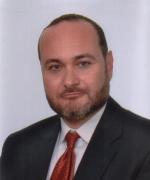 Dr.Solon Solomon is Lecturer in the Division of Public and International Law at the Brunel University London School of Law. He has served as member of the Knesset Legal Department on international and constitutional issues and has held academic positions among others as Visiting Lecturer at King's College London Dickson Poon School of Law, Sessional Lecturer at the University of Reading School of Law and Teaching Fellow at SOAS.
Dr.Solon Solomon is Lecturer in the Division of Public and International Law at the Brunel University London School of Law. He has served as member of the Knesset Legal Department on international and constitutional issues and has held academic positions among others as Visiting Lecturer at King's College London Dickson Poon School of Law, Sessional Lecturer at the University of Reading School of Law and Teaching Fellow at SOAS.
Dr Solomon holds a PhD from King's College London Dickson Poon School of Law, an LLM in Public International Law from the Hebrew University of Jerusalem, where he was recipient of the George Weber Award and a First-Class Honors Bachelor of Laws from the Aristotle University of Thessaloniki. He has been a visiting scholar at Tel Aviv University, at Humboldt-Universitat zu Berlin and at the British Institute of International and Comparative Law.
Author of The Justiciability of International Disputes (WLP, 2009) cited before the Permanent Court of Arbitration and co-editor of the volume Applying International Humanitarian Law in Judicial and Quasi-Judicial Bodies: International and Domestic Aspects (TMC Asser Press, 2014), his research has appeared in journals like the Chinese Journal of International Law, the Cardozo Journal of International and Comparative Law, the German Law Journal and the Netherlands Quarterly of Human Rights and has been presented in a number of academic venues, including the University of Cambridge, the Harvard Law School, the University of Melbourne, the Australian National University and the University of Geneva. Dr. Solomon has also a media presence with his opinions cited or hosted in outlets such as the Times of London, the Financial Times, the Straits Times, der Tagesspiegel and Haaretz.
|
|
 Dr Aurel Sari is a Senior Lecturer in Law at the University of Exeter, specializing in public international law. His work focuses mainly on questions of operational law, including the law of armed conflict, the legal status of foreign armed forces and the application of human rights law in deployed operations. Dr Sari has published widely in leading academic journals on status of forces agreements, peace support operations and the legal aspects of European security and defence policy. Dr Sari maintains close working relationships with legal practitioners in the armed forces and lectures regularly on the subject of international law and military operations in the UK and abroad.
Dr Aurel Sari is a Senior Lecturer in Law at the University of Exeter, specializing in public international law. His work focuses mainly on questions of operational law, including the law of armed conflict, the legal status of foreign armed forces and the application of human rights law in deployed operations. Dr Sari has published widely in leading academic journals on status of forces agreements, peace support operations and the legal aspects of European security and defence policy. Dr Sari maintains close working relationships with legal practitioners in the armed forces and lectures regularly on the subject of international law and military operations in the UK and abroad.
Dr Sari is a member of the Committee of the UK National Group of the International Society for Military Law and the Law of War and a Fellow of the Allied Rapid Reaction Corps. Please visit his website and his SSRN pages for more information on his work.
|
|
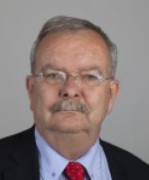 Dr Marco Sassòli, a citizen of Switzerland and Italy, is professor of international law at the Faculty of Law of the University of Geneva. From 2001-2003, he has been professor of international law at the Université du Québec à Montreal, Canada, where he remains associate professor. He is commissioner (and alternate member of the Executive Committee) of the International Commission of Jurists (ICJ). Marco Sassòli graduated as doctor of laws at the University of Basel (Switzerland) and was admitted to the Swiss bar. He has worked from 1985-1997 for the International Committee of the Red Cross (ICRC) at the headquarters, inter alia as deputy head of its legal division, and in the field, inter alia as head of the ICRC delegations in Jordan and Syria and as protection coordinator for the former Yugoslavia. During a sabbatical leave in 2011, he joined again the ICRC, as legal adviser to its delegation in Islamabad. He has also served as executive secretary of the ICJ, as registrar at the Swiss Supreme Court, and from 2004-2013 as chair of the board of Geneva Call, an NGO engaging non-State armed actors to respect humanitarian rules. From 2009-2016, he has been director of the Department of international law and international organization of the University of Geneva. Marco Sassòli has published on international humanitarian law (inter alia How Does Law Protect in War? 3rd ed., Geneva, ICRC, 2011, 2580 pp. (with A. Bouvier and A. Quintin, which is updated online on the ICRC website under https://www.icrc.org/casebook/) and The 1949 Geneva Conventions, A Commentary (ed., with A. Clapham and P. Gaeta), Oxford, OUP, 2015, 1651 pp.), human rights law, international criminal law, the sources of international law, the responsibility of states and non-state actors, and Swiss constitutional law.
Dr Marco Sassòli, a citizen of Switzerland and Italy, is professor of international law at the Faculty of Law of the University of Geneva. From 2001-2003, he has been professor of international law at the Université du Québec à Montreal, Canada, where he remains associate professor. He is commissioner (and alternate member of the Executive Committee) of the International Commission of Jurists (ICJ). Marco Sassòli graduated as doctor of laws at the University of Basel (Switzerland) and was admitted to the Swiss bar. He has worked from 1985-1997 for the International Committee of the Red Cross (ICRC) at the headquarters, inter alia as deputy head of its legal division, and in the field, inter alia as head of the ICRC delegations in Jordan and Syria and as protection coordinator for the former Yugoslavia. During a sabbatical leave in 2011, he joined again the ICRC, as legal adviser to its delegation in Islamabad. He has also served as executive secretary of the ICJ, as registrar at the Swiss Supreme Court, and from 2004-2013 as chair of the board of Geneva Call, an NGO engaging non-State armed actors to respect humanitarian rules. From 2009-2016, he has been director of the Department of international law and international organization of the University of Geneva. Marco Sassòli has published on international humanitarian law (inter alia How Does Law Protect in War? 3rd ed., Geneva, ICRC, 2011, 2580 pp. (with A. Bouvier and A. Quintin, which is updated online on the ICRC website under https://www.icrc.org/casebook/) and The 1949 Geneva Conventions, A Commentary (ed., with A. Clapham and P. Gaeta), Oxford, OUP, 2015, 1651 pp.), human rights law, international criminal law, the sources of international law, the responsibility of states and non-state actors, and Swiss constitutional law.
|
|
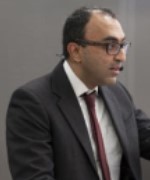 Dr Sandesh Sivakumaran is Professor of Public International Law at the University of Nottingham. He is a non-resident research scholar at the United States Naval War College
Stockton Center for International Law, a member of the advisory board of Geneva Call, and a member of the working group on non-state armed groups at the Centre of
Competence on Humanitarian Negotiation. Sandesh is the author of The Law of Non-International Armed Conflict (Oxford University Press, 2012), which was awarded the
International Committee of the Red Cross Paul Reuter Prize, the American Society of International Law Francis Lieber Prize, and (jointly) the European Society of International
Law Book Prize. He is a co-author of Oppenheim's International Law: United Nations (Oxford University Press, 2017) and Cases and Materials on International Law
(Sweet and Maxwell, 8 ed, 2015) and co-editor of International Human Rights Law (Oxford University Press, 3 ed, 2017).
Dr Sandesh Sivakumaran is Professor of Public International Law at the University of Nottingham. He is a non-resident research scholar at the United States Naval War College
Stockton Center for International Law, a member of the advisory board of Geneva Call, and a member of the working group on non-state armed groups at the Centre of
Competence on Humanitarian Negotiation. Sandesh is the author of The Law of Non-International Armed Conflict (Oxford University Press, 2012), which was awarded the
International Committee of the Red Cross Paul Reuter Prize, the American Society of International Law Francis Lieber Prize, and (jointly) the European Society of International
Law Book Prize. He is a co-author of Oppenheim's International Law: United Nations (Oxford University Press, 2017) and Cases and Materials on International Law
(Sweet and Maxwell, 8 ed, 2015) and co-editor of International Human Rights Law (Oxford University Press, 3 ed, 2017). |
|
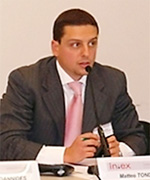 Dr Matteo Tondini (Laurea - Macerata; MA - CASD, Rome; PhD - IMT, Lucca) is a naval (staff) officer, military legal advisor and researcher, specializing in international/operational law and security issues.
As a military legal advisor Matteo has served at the Italian Navy General Staff – Office of Legal Affairs, and in all the principal anti-migrant smuggling operations carried out so far by the Italian Navy and the European Union in Southern Central Mediterranean Sea, namely ' Operation Mare Nostrum', ' Operation Mare Sicuro', and 'EUNAVFOR-MED Operation Sophia'. Before joining the Italian Navy, he worked in several countries in a variety of capacities and circumstances, including assignments as researcher and advisor in in Afghanistan, Kosovo, United Kingdom, the Netherlands and Belgium.
Matteo is the author of a research monograph and several articles/chapters, published in international journals and edited collections. He is also member of several professional societies and associations (ISMLLW, Sanremo IIHL; Italian Society of International Law, amongst others).
His research interests range from post-conflict state-building to international terrorism, use of force, security studies and beyond. To read more about Matteo, feel free to visit his personal webpage. He may be contacted here.
Dr Matteo Tondini (Laurea - Macerata; MA - CASD, Rome; PhD - IMT, Lucca) is a naval (staff) officer, military legal advisor and researcher, specializing in international/operational law and security issues.
As a military legal advisor Matteo has served at the Italian Navy General Staff – Office of Legal Affairs, and in all the principal anti-migrant smuggling operations carried out so far by the Italian Navy and the European Union in Southern Central Mediterranean Sea, namely ' Operation Mare Nostrum', ' Operation Mare Sicuro', and 'EUNAVFOR-MED Operation Sophia'. Before joining the Italian Navy, he worked in several countries in a variety of capacities and circumstances, including assignments as researcher and advisor in in Afghanistan, Kosovo, United Kingdom, the Netherlands and Belgium.
Matteo is the author of a research monograph and several articles/chapters, published in international journals and edited collections. He is also member of several professional societies and associations (ISMLLW, Sanremo IIHL; Italian Society of International Law, amongst others).
His research interests range from post-conflict state-building to international terrorism, use of force, security studies and beyond. To read more about Matteo, feel free to visit his personal webpage. He may be contacted here.
|
|
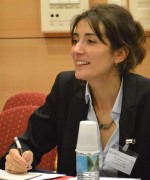 Dr Muriel Ubeda-Saillard est professeur agrégé de droit public à l’Université Lille 2 depuis 2014, après avoir été Maître de Conférences pendant trois ans à l’Université Paris Nanterre. Elle est membre du CRDP (Centre de recherches Droits et perspectives du droit, à Lille 2), du CEDIN (Centre de droit international) de l’université Paris Nanterre et de diverses associations scientifiques. Vice-Présidente de l’université Lille 2 et Directrice du Master 2 Justice pénale internationale, elle enseigne le droit international public, notamment dans ses branches pénale et humanitaire. Elle a beaucoup écrit dans ce champ, dans le sillage de sa thèse consacrée à la coopération des Etats avec les juridictions pénales internationales. Elle est notamment co-auteur, depuis 2014, de la chronique portant sur l’activité des juridictions pénales internationales, qui paraît chaque année à l’Annuaire français de droit international.
Dr Muriel Ubeda-Saillard est professeur agrégé de droit public à l’Université Lille 2 depuis 2014, après avoir été Maître de Conférences pendant trois ans à l’Université Paris Nanterre. Elle est membre du CRDP (Centre de recherches Droits et perspectives du droit, à Lille 2), du CEDIN (Centre de droit international) de l’université Paris Nanterre et de diverses associations scientifiques. Vice-Présidente de l’université Lille 2 et Directrice du Master 2 Justice pénale internationale, elle enseigne le droit international public, notamment dans ses branches pénale et humanitaire. Elle a beaucoup écrit dans ce champ, dans le sillage de sa thèse consacrée à la coopération des Etats avec les juridictions pénales internationales. Elle est notamment co-auteur, depuis 2014, de la chronique portant sur l’activité des juridictions pénales internationales, qui paraît chaque année à l’Annuaire français de droit international. |
|
 Dr Marten Zwanenburg is a legal counsel with the Directorate of International Law department of the Ministry of Foreign Affairs of the Netherlands. He previously worked in the Directorate of Legal Affairs of the Ministry of Defense. He also teaches a course on UN peacekeeping in the Master of Advanced Studies in International Public Law program at Leiden University. He has published widely on International Humanitarian Law and collective security law. His PhD dissertation ‘Accountability of Peace Support Operations’ was published by Brill publishers in 2005, and received several prizes including the 2006 Paul Reuter prize of the International Committee of the Red Cross. His research interests include International Humanitarian Law, peace operations and cyber.
Dr Marten Zwanenburg is a legal counsel with the Directorate of International Law department of the Ministry of Foreign Affairs of the Netherlands. He previously worked in the Directorate of Legal Affairs of the Ministry of Defense. He also teaches a course on UN peacekeeping in the Master of Advanced Studies in International Public Law program at Leiden University. He has published widely on International Humanitarian Law and collective security law. His PhD dissertation ‘Accountability of Peace Support Operations’ was published by Brill publishers in 2005, and received several prizes including the 2006 Paul Reuter prize of the International Committee of the Red Cross. His research interests include International Humanitarian Law, peace operations and cyber.
|
|
Henry Bantick - Melbourne Law School (JD Candidate)
|
|
Corina-Tess Mcintyre - Melbourne Law School (JD Candidate)
|
|
Lauren Battersby - Melbourne Law School (JD Candidate)
|
|
James Hogan - Melbourne Law School (JD Candidate)
|
|
Anasha Flintoff - Melbourne Law School (JD Candidate)
|
|
Vittorio Alovisi - Università degli Studi di Torino / Centro Alti Studi per la Difesa – Roma
|
|
VAndreja Friškovec - European Faculty of Law, New University, Slovenia
|
|
Maj. Rodrigo de Lorenzo - Armed Forces of Spain Legal Branch
|
|
|